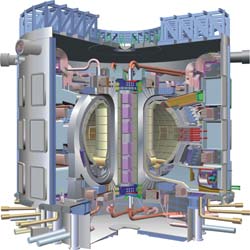
Model of the ITER device
Neutronic studies conducted by CAS researchers for the International Thermonuclear Experimental Reactor (ITER) project are spoken highly by an international panel of experts.
At a few recent meetings to review the developments of ITER tasks held in Cadarache, France, Prof. WU Yican and Dr. ZHENG Shanliang from the Institute of Plasma Physics (IPP), the CAS Hefei Institutes of Physical Sciences, reported to more than 20 participants the achievements scored by the FDS (Fusion Design Study) team of IPP on research tasks commissioned by ITER, and put forward suggestions on its future development. The work won unanimous praise from their international peers.
The neutronic research in a reactor is to explore neutrons' movement, their interaction with other nuclides within the reactor and their influence on reactor's performances. The study lays disciplinary basis for the design of a reactor, the assessment of nuclear safety and its impact on the environment, and the radioactive damage caused on a material. At the same time, it is applicable to other fields of nuclear technology, such as neutron photography, detection and measurement, and neutron radio-therapy against cancers. As early as in 2005, an ITER research task conducted by IPP scientists on "Nuclear analysis of the upper port of ITER" was accepted. Just because of the success, ITER decided to recommend Chinese scientists to work for two other research tasks under the titles of "Update of the ITER 3-D model for MCNP and the nuclear data library for dose calculation" and "testing and application of A CAD/MCNP interface program for ITER neutronic design and calculations."
Based on the experience and academic buildup from the first task, IPP scientists completed their research work on the other two projects, laying a solid foundation for the modeling, databases and modular software for the future research and nuclear safety analysis of ITER. At present, the research results, such as software, data libraries and models derived from the two tasks have been applied in EU, US, Japan, ROK and India, making an indelible contribution to the ITER in the aspects of future design and analysis.
In a letter to Prof. Wu, Dr. H. Iida, an ITER officer in charge of the neutronic tasks, said that the CAS team has become "one of leading groups in the world," making remarkable progress in some neutronic topics, reaching "the most advanced level." In addition, many authoritative experts in this field in the EU, US and Japan also pour praises into the team. In 2007, for example, the American Nuclear Society Annual Meeting has invited Prof. Wu, the head of the team, to Boston to deliver a lecture on this regard.





